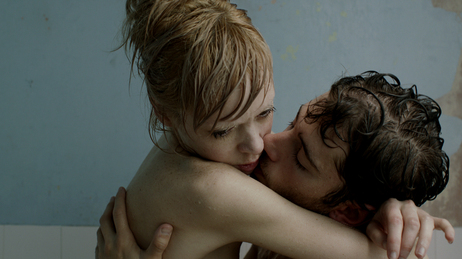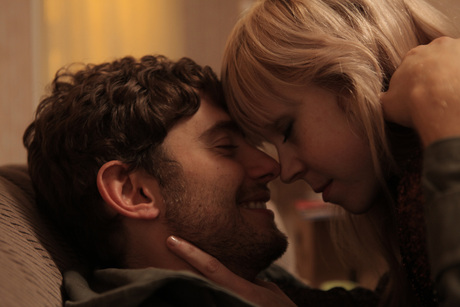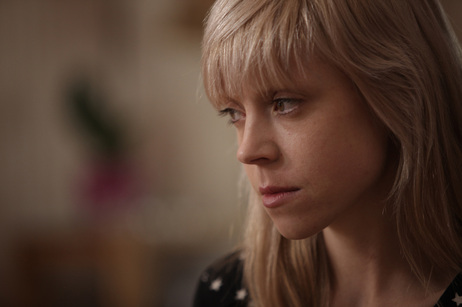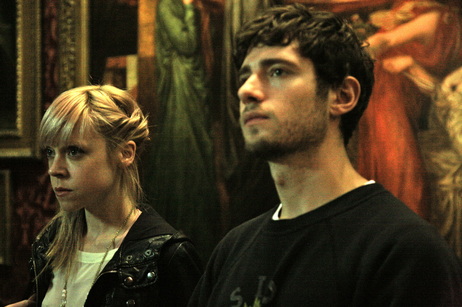|
|
Kelly+Victor is the first fiction feature debut from Welsh director Kieran Evans. The film is adapted from the acclaimed novel by Niall Griffiths and follows the brief relationship of two troubled individuals - Kelly (Antonia Campbell-Hughes) and Victor (Julian Morris) - who embark on a passionate yet volatile relationship. The film deals with issues of abuse, perversions and fetishes and does not shy away from its adult content. In doing so, it captures the complexity and realism of relationships and makes for compelling viewing.
Kelly and Victor meet on the dance floor of a Liverpool nightclub before spending the night together and succumbing to their instant lust and hunger for one and other. Their attraction is instant. Their relationship is brief but violent, however. Victor is submissive and allows Kelly to take control of their relationship and his body. As the narrative unfolds, explanations for Victor’s abuse and Kelly’s dominance become clear as it is revealed that Kelly has been submitted to the abuse of a partner and Victor is seeking sexual freedom. The relationship between the two ends abruptly and with devastating consequences. Taboo-breaking and scandalous, Kelly+Victor is a beautiful shot film with strong performances. It has been compared to Steve McQueen’s Shame (2012) as both films tackle themes of sexual obsession and include numerous explicit sex scenes. The film also invites comparison with Blue is the Warmest Colour (2013) which dealt with the complexity of romance and featured long sex scenes. Like Blue is the Warmest Colour, Kelly+Victor should not be dismissed as being simply pornography. The film is intelligent in its presentation of a mature relationship and never comes across as cheap exploitation. The success of the film is the unpredictability of the narrative which accentuates the dramatic impact of the conclusion of their relationship. Antonia Campbell-Hughes and Julian Morris are entrancing. Campbell-Hughes portrays Kelly as a vulnerable and deeply troubled individual who is as much a victim as Victor is. The actress manages to capture the emotional trauma Kelly has gone through during her life in her hard and rigid facial expressions and bodily movements. Morris is compelling as Victor and successfully captures the character’s troubled naivety and curiosity. Victor has a childlike vulnerability and, like Kelly, he is very much out of place in the brutal urban world that they inhabit. Morris manages to portray the frustration and confusion Victor feels as he comes to terms with his sexual fantasies and desires. The naturalistic and well-crafted cinematography portrays the urban decay of the city of Liverpool via shots of the run-down council estate where Kelly works in a shabby gift shop as well as shots of the scrapyard where Victor works. The use of close ups during the sex scenes captures the sensuality of the human body and touch as well as showing the intimacy between the characters. The sounds of breathless panting and muffled moans during the sex scenes heighten the intensity of the sexual acts. During the acts of brutality and abuse the sound becomes muted and softened, downplaying the extremity of the abuse on the body and distancing the viewer from the characters. The use of Viking Moses’s song “Dancing by the Water Day” is used to great effect as a recurring motif throughout the film. A scene where Kelly and Victor dance to the song on top of a multi-story car park is one of the strongest and most powerful scenes in the film. The film artfully conveys the brief duration of a deeply disturbed romance. It is a damaged love story that encapsulates the concept that everyone has their own hidden lusts and desires. The film highlights issues around setting boundaries and restrictions when engaging in dangerous sexual acts in a mature manner, treating its audience as intelligent adults. Kelly+Victor is a film which is more than just a series of hardcore sex scenes. It is a tragic tale of two star-crossed lovers whose love for one and other can only end in heartbreak. |






